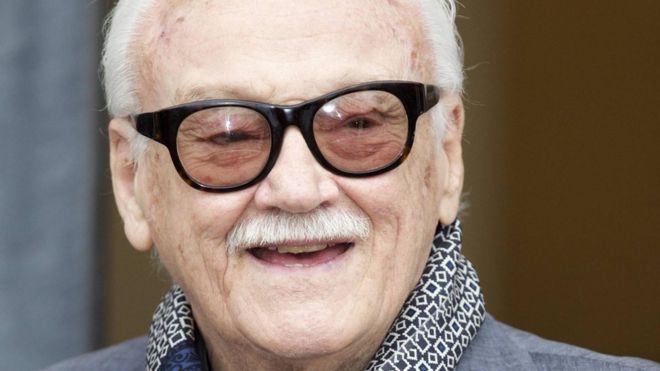
By Peter Keepnews
Toots Thielemans, one of the only musicians to have a successful career as a jazz harmonica player, died on Monday in Brussels. He was 94.
The death was confirmed by Mr. Thielemans’s agency, which did not specify a cause. Mr. Thielemans, who retired in 2014 for health reasons, had been hospitalized recently with a broken arm.
That Mr. Thielemans played jazz on the harmonica was unusual enough. Even more unusual was how he first gained international attention: by playing guitar and whistling in unison.
He introduced this approach in 1961 on his recording of the wistful but jaunty jazz waltz “Bluesette,” which he wrote.
The record became an international hit, and the song was his signature. It also became a jazz standard, recorded by numerous instrumentalists, among them Chet Atkins, Tito Puente and Mr. Thielemans himself, who went on to record it several more times. It was also recorded, with lyrics by Norman Gimbel, by Sarah Vaughan and other singers.
But his distinctive sound on the chromatic harmonica was Mr. Thielemans’s primary claim to fame and, especially, to fortune.
Although his name was well known in the jazz world — he performed with greats like Ella Fitzgerald, Benny Goodman and Charlie Parker — it was relatively unknown to the general public; his playing, on the other hand, was virtually ubiquitous.
It can be heard on the soundtracks of movies including “Midnight Cowboy” and “The Getaway.” It was featured in television commercials and on records by, among many others, Ms. Fitzgerald, Paul Simon, Billy Joel, Dizzy Gillespie and Quincy Jones, who once called Mr. Thielemans “one of the greatest musicians of our time.” For more than four decades, it has been heard in the opening theme music of “Sesame Street.”
Jean-Baptiste Frédéric Isidore Thielemans was born on April 29, 1922, in Brussels, where his parents owned a cafe. He offered various explanations over the years for how he came to be known as Toots, sometimes saying he chose the name himself and at others saying it was given to him; whatever the truth, the name was apparently borrowed from two American jazz musicians, Nuncio Mondello and Salvador Camarata, who both went by Toots.
Musically inclined from an early age, he began playing the accordion at 3 and took up the harmonica in his teens. A few years later, inspired by Django Reinhardt, a fellow Belgian, he began playing guitar, as well. By the end of World War II he had become a full-time musician.
In 1949, he shared the stage with Charlie Parker at the Paris Jazz Festival, and a year later he toured Europe as the guitarist in a sextet led by Benny Goodman. He moved to the United States in 1951 and eventually became a citizen.
From 1953 to 1959, he was a member of the British jazz pianist George Shearing’s popular quintet. He mostly played guitar with Mr. Shearing, but his harmonica work was featured on at least one number at every performance. It was also showcased on the handful of albums he recorded as a leader in those years.
After leaving the Shearing group, Mr. Thielemans became a busy studio musician, even spending a few years on staff at ABC. But he remained active in jazz, with the harmonica now his main instrument. He toured frequently, and occasionally recorded as the leader of a small group, for the rest of his life.
Most of his albums presented him in a straightforward jazz context, but late in his career they took on a more international color. On “The Brasil Project,” released in 1992, and a follow-up, released the next year, he collaborated with Milton Nascimento, Gilberto Gil and other prominent Brazilian artists. And on the 1998 album “Chez Toots” he returned to his roots, leading a group of French and Belgian musicians in a program of French songs.
Playing a set in New York a few months after turning 80, Mr. Thielemans “seemed dazzled by his glorious sunset, and found shelter under the umbrella of sophisticated schmaltz,” Ben Ratliff wrote in The New York Times, adding: “He’s in good shape, only losing wind at the end of a long string of notes; but he finds off-centered rhythms, attaining a little bit of freedom, knocking his instrument from side to side for tremolos.”
Albert II, then the king of Belgium, bestowed on Mr. Thielemans the honorary title of baron in 2001. The country’s prime minister, Charles Michel, said on Monday, “We have lost a great musician, a warm personality.”
The National Endowment for the Arts named Mr. Thielemans a jazz master for 2009, the highest honor that can be accorded a jazz musician in the United States. “I accept this distinction with pride and emotion,” he said at the time, adding that he had only “played at music” until a Louis Armstrong record in 1940 provided “instant contamination” and changed the direction of his life.
Mr. Thielemans lived in La Hulpe, a suburb of Brussels. Information on survivors was not immediately available.
In March 2006, Mr. Thielemans was the guest of honor at an all-star Carnegie Hall tribute concert, with the pianist Herbie Hancock and the clarinetist Paquito D’Rivera among the performers. Reviewing the concert for The Times, Nate Chinen praised both Mr. Thielemans’s “exuberantly expressive” playing and his infectious spirit.
“No one stole the spotlight from Mr. Thielemans,” he wrote. “He was having giddy fun, and the feeling was contagious.”
No comments:
Post a Comment